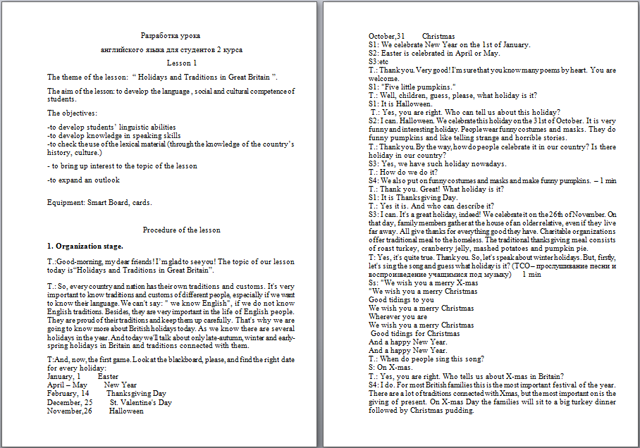The aim of the lesson:
to develop the language, social and cultural competence of students.
The objectives:
- to develop students’ linguistic abilities;
- to develop knowledge in speaking skills;
- to check the use of the lexical material (through the knowledge of the country’s history, culture.);
- to bring up interest to the topic of the lesson;
- to expand an outlook.
Procedure of the lesson.
1. Organization stage.
T.:Good-morning, my dear friends! I’m glad to see you! The topic of our lesson today is “Holidays and Traditions in Great Britain”.
Т.: So, every country and nation has their own traditions and customs. It's very important to know traditions and customs of different people, especially if we want to know their language.
We can't say: "we know English", if we do not know English traditions. Besides, they are very important in the life of English people. They are proud of their traditions and keep them up carefully.
That's why we are going to know more about British holidays today. As we know there are several holidays in the year. And today we'll talk about only late-autumn, winter and early-spring holidays in Britain and traditions connected with them.
T: And, now, the first game. Look at the blackboard, please, and find the right date for every holiday:
January, 1 Easter
April – May New Year
February, 14 Thanksgiving Day
December, 25 St. Valentine's Day
November, 26 Halloween
October, 31 Christmas
S1: We celebrate New Year on the 1st of January.
S2: Easter is celebrated in April or May.
S3: etc

Т.: Thank you. Very good! I'm sure that you know many poems by heart. You are welcome.
S1: "Five little pumpkins."
Т.: Well, children, guess, please, what holiday is it?
S1: It is Halloween.
Т.: Yes, you are right. Who can tell us about this holiday?
S2: I can. Halloween. We celebrate this holiday on the 31st of October. It is very funny and interesting holiday. People wear funny costumes and masks. They do funny pumpkins and like telling strange and horrible stories.
Т.: Thank you. By the way, how do people celebrate it in our country? Is there holiday in our country?
S3: Yes, we have such holiday nowadays.
Т.: How do we do it?
S4: We also put on funny costumes and masks and make funny pumpkins. – 1 min
Т.: Thank you. Great! What holiday is it?
S1: It is Thanksgiving Day.
Т.: Yes it is. And who can describe it?
S3: I can. It's a great holiday, indeed! We celebrate it on the 26th of November. On that day, family members gather at the house of an older relative, even if they live far away.
All give thanks for everything good they have. Charitable organizations offer traditional meal to the homeless. The traditional thanksgiving meal consists of roast turkey, cranberry jelly, mashed potatoes and pumpkin pie.
T: Yes, it's quite true. Thank you. So, let's speak about winter holidays. But, firstly, let's sing the song and guess what holiday is it? (TCО – пܶрܶосܶлуܶшܶиܶвܶаܶнܶиܶе пܶесܶнܶи и вܶосܶпܶрܶоܶиܶзܶвܶеܶдܶеܶнܶиܶе учܶаܶщܶиܶмܶисܶя пܶоܶд муܶзܶыܶку) 1 min
Ss: "We wish you a merry X-mas
"We wish you a merry Christmas
Good tidings to you
We wish you a merry Christmas
Wherever you are
We wish you a merry Christmas
Good tidings for Christmas
And a happy New Year.
Весь материал - в документе.

 Получите свидетельство
Получите свидетельство Вход
Вход











 Holidays and Traditions in Great Britain (21 КB)
Holidays and Traditions in Great Britain (21 КB)
 0
0 1011
1011 98
98 Нравится
0
Нравится
0









